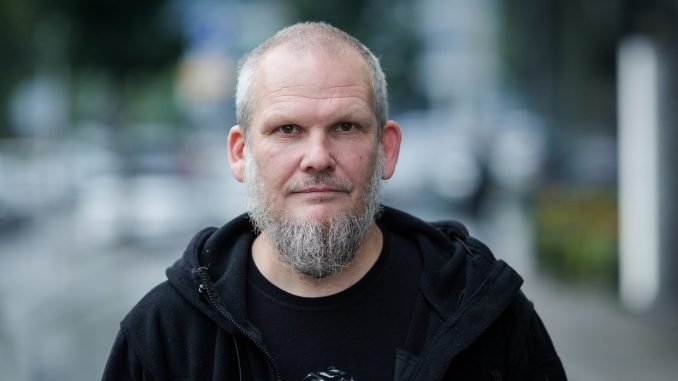
I am truly unwilling to divide and split Lithuanian citizens celebrating the centenary of re-established statehood into reliable and less reliable, patriots and idiots in the antique sense of the word, however you split yourselves and I am simply left to conclude the obvious fact or politely pretend that I failed to notice it and fundamental differences of world view are simply insignificant differences of opinion.
“Should Lithuania develop closer relations with Russia even if this would harm Lithuanian security?” 34.4%, a little over a third of respondents answered this question positively.
I will not pretend I was greatly surprised or shocked after reading the survey results. This is, of course, significantly less than the 52% who answered positively when asked if they support Prime Minister Saulius Skvernelis‘ position that Lithuania should renew political contacts with Russia. But this time the question was very straightforward – not just better relations are brought up, they are not linked with the words of a prime minister who has yet to squander all of his popularity and even the price is identified – a threat to Lithuanian security.
Does this mean that a third of Lithuania is a Russian fifth column, which under conditions similar to 1940 would meet occupiers’ tanks with flowers and during a hybrid threat, such as that in Ukraine, would form Vilnius or Klaipėda “people’s republic” self-defence squads and institutions? I do bit believe that there would be far fewer such traitors, however specifically this third, together with those absolutely uninterested in what is happening in the country, disinterested in the fate of their country, could form the obedient majority which would form favourable conditions for occupation to establish itself through their non-resistance.
The pro-Russian third of Lithuania did not appear from nowhere in recent years, magically influenced by Russian propaganda TV channels or news portals retelling those news in Lithuanian. The difference between Lithuanians identifying with the LTSR [Lithuanian Soviet Socialist Republic] and the 1918-1940 Republic of Lithuania political traditions never vanished, just we sometimes chose to not see it in an imitation of national unity.
By banning Soviet symbols and public glorification of the occupiers’ crimes we simply pushed them out from the public sphere to the private where the grandchildren of the istrebitels [Soviet paramilitary destruction batallions] celebrate the Soviet army day, make selfies with the statues of Grūtas park and fill concert halls for regularly visiting Russian propaganda performers. Specifically for them Lithuanian TV channels broadcast morning to evening shows that reek of Soviet nostalgia and Russian criminal spirituality, few celebrations avoid a nostalgic barrel of kvass or ice cream which imitates the tastes of the generation born in the mid-20th century. “Soviet sausages” are long gone, but their buyers remain, easily getting hooked by every market brand which exploits Soviet nostalgia.
When caught overly openly demonstrating the signs of the Soviet era, as happened in the international tourism fair Adventur 2018 or last year’s Druskininkai resort celebration, which featured a parade with youths wearing Soviet pioneer neckties, accompanied by a restored militsiya [Soviet police] moskvich, they receive roughly equal numbers of condemning and supporting comments. The authors of the latter feign ignorance at what could have been wrong because “we all lived in that country” and “it is a part of our history.” Because their real homeland was and remains the LTSR, where their parents and grandparents held important posts and enjoyed exclusive privileges or perhaps also contributed to the destruction of partisans, to exile and the persecution of dissidents.
Russian propaganda simply needs not force itself into our homes by force because its tales fall on fertile soil. Thus when you ban one Kremlin controlled TV channel, its viewers – LTSR citizens with Lithuanian Republic passports will quickly find another, will seek similar content online.
Upon admitting the obvious fact, we can now plan how to restore the country’s political system so that the third would not bring us a repeat of the catastrophe of 1940, to reduce its influence on political decisions and clearly demonstrate that every politician elected by it not for Lithuania, but for Russia will be isolated and impeached – regardless if they become a regular member of Seimas who breached his oath like Mindaugas Bastys or the president, like Rolandas Paksas.
“It is stated that Russia always was and always will be an aggressive country. Earlier the same was said of Germany and France. Why is Russia an exception and why is it unpatriotic to think that nations and states can change?” writes VU TSPMI lecturer Kęstutis Girnius.
And he’s right, Russia certainly is changing – the opposition is increasingly persecuted, its citizens’ minds are washed in preparation for an inevitable war with the West, Stalin and the NKVD are canonised, the annexed Crimea is not being returned to Ukraine and war is continued in Donbass, Syrian residential areas, schools and hospitals are bombed and quite recently nuclear rockets aimed at us were presented in Kaliningrad. And certainly earlier this was said of Germany – in 1937-1940.
For real change Germany needed millions of pointless victims, destroyed cities and the Nurnberg Tribunal. When Vladimir Putin is prosecuted for war crimes and Russia is divided into sectors of the countries, which free her, same as post-war Germany, then I will wholeheartedly agree that we should improve relations with it.

Be the first to comment